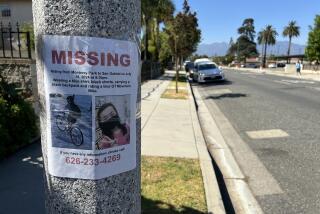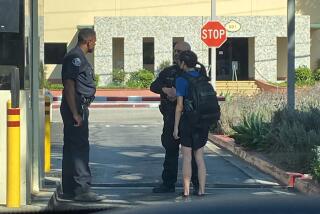Darkness at the Doorstep
- Share via
I remember hearing a noise from outside sometime in the long, lingering interval between midnight and sunrise and going to the front door.
I looked out and was greeted only by darkness and silence and by a porch light that glowed into night’s immensity.
My son was somewhere out there. He was a young teenager then and had disappeared one day after school and dropped into the void that shields missing children.
I stood in the open doorway for what seemed hours, hoping that the noise I’d heard had been him, a young boy afraid to leave and afraid to come home, but nothing stirred.
I called his name. Silence. Then I closed the door and returned to face another hopelessly sleepless night.
My son, now grown and wonderfully responsible, had simply decided to hit the high road of adventure as his pop had done years before. He was home and happy a few days later.
But I recall the anguish of his disappearance with the clarity of a gong and empathize with anyone who must face the same darkness at their doorstep. Janine Alexander is one of them. Her daughter, 16-year-old Katie McGurk, disappeared last week and remains missing at this writing.
Coming as it did during the search for kidnapped Anthony Martinez, who was later found murdered, her disappearance received special attention until authorities decided Katie was a runaway. Then she dropped from the news.
But I haven’t forgotten her.
*
“I can’t eat and I can’t sleep,” Alexander told me over the phone from Phoenix, Ariz., where her search for Katie has taken her. “I was cold the other night and started to pull a blanket over me. Then I thought, why should I be warm when Katie probably isn’t?”
She has been in Phoenix since Tuesday, searching the areas where homeless adults and runaway children congregate. A trucker who had seen Katie’s face on television called Alexander in Calabasas to tell her he had seen the girl in Arizona.
“She was near a truck stop and scared to death,” the mother says. “He knew she didn’t belong out there. I’m scared to death too. It isn’t a safe world.”
She believes that once authorities here and in Phoenix decided her daughter was not a kidnap victim, their interest vanished as quickly as Katie had. “Runaways are throwaways,” Alexander said. “The police just aren’t interested in them.”
A spokesman for the L.A. County Sheriff’s Department said that while the investigation is continuing, Katie’s disappearance is being handled as a runaway and not a kidnapping.
Under ordinary circumstances, the explosion of publicity that initially accompanied the girl’s disappearance would not have occurred, except that the ghost of Anthony Martinez, his smile fixed on the public memory, cast a long shadow over Calabasas.
Three days after Katie vanished, Anthony’s body was discovered in a rocky desert ravine near Indio.
Alexander, whose tree-shaded, hillside home has no television set, was across the street watching the news when the corpse was discovered. Her own fears burst through an emotional facade and she ran from the house crying.
Cameras waited outside, but when Katie’s disappearance was deemed to be a runaway, they faded back into the windy night as seamlessly as a cinematic dissolve, leaving the darkness to the gale.
*
I understand priorities. There are roughly 200,000 runaways wandering the streets of the country and not enough police to track them down or journalists to report on them.
And yet I’m troubled by the attitude that considers their plights less significant than leaves blown to the distance by idle winds.
There are complexities of reasons why kids run away and I won’t speculate on what drove Katie from the home of an obviously caring mother.
I do know that the world grows more dangerous for children every day, in their homes and on the street, and not enough attention is being devoted to their well-being.
Only when a Polly Klaas or an Anthony Martinez emerges in bloody imagery on the nightly news do we pause to look up, pass out leaflets, donate money and wear ribbons. Tears are shed. Prayers are said. And then we bury our innocents and move on.
Alexander said, “I realized as I haunted the places where runaways gathered that every kid there had a parent somewhere who was probably devastated.”
That’s not always true, but to those who do care, who wait and cry and wonder, who hurry to the front door at the slightest noise, the darkness and the silence outside that door are deep and impenetrable. I know.
Al Martinez can be reached online at al.martinez@latimes.com


